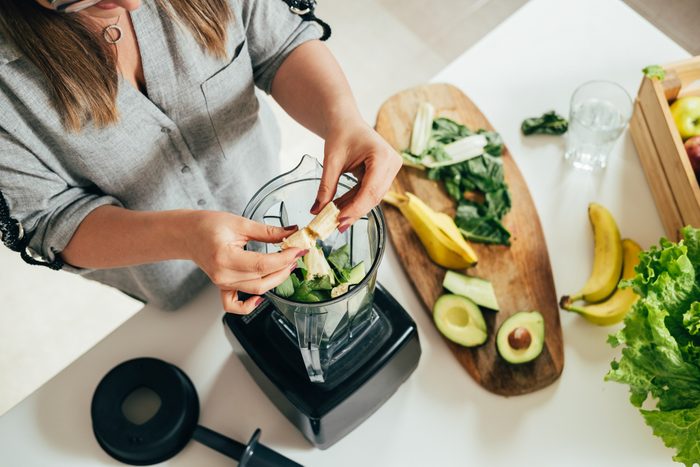
Eat more plants
If you love to dive into a colorful bowl of fruits and vegetables, you’ve got guts—or, should we say, a healthy gut! Research shows that eating more plants in your diet can actually benefit your gut health over time—especially if you’re eating a variety of fruits and veggies each week. According to a study published by the American Gut Project, which is led by researchers at the University of California San Diego School of Medicine, participants who ate more than 30 different types of plants in a week had a more diverse gut microbiome compared to those who ate 10 or fewer.
The researchers collected this data from over 11,000 participants primarily in the United States and the United Kingdom, as well as 42 other countries. Participants sent in over 15,000 stool samples to evaluate bacteria in the gut. From their evaluation, the researchers found that no matter the type of diet one follows, eating more than 30 different kinds of plants in a week creates a diverse gut microbiome. A healthy gut is linked to benefiting the body’s health in a number of ways that are gaining more attention lately.
Get The Healthy @Reader’s Digest newsletter

Why having a diverse microbiome matters
The gut microbiome isn’t exactly a body part, but a thriving community of bacteria primarily located in your small and large intestine. Harvard Health states the microbiome is considered to be a supporting organ, due to the many ways it contributes to the body’s functioning and health.
The most common types of microbes within the gut are symbiotic (benefiting the body) and pathogenic (which promote disease). While a healthy gut would have a balance of the two, certain factors such as infectious illness, poor diets, or prolonged use of antibiotics can cause dysbiosis—an imbalance of microbiota that makes the body susceptible to diseases. Recent research has even linked gut health and mental well-being and found links between poor gut health and depression.

It can benefit your blood sugar, too
Microbiota in the gut is also important for breaking down complex carbohydrates and dietary fibers, converting them into short-chain fatty acids (SCFA). As a result, these short-chain fatty acids are key for muscle function and even preventing some chronic diseases. A higher number of SCFA also benefit blood sugar levels by reducing insulin resistance. Most plants are considered powerful sources of fiber.

How to incorporate more plants into your diet
Eating 30 different kinds of plants in one week may seem daunting, but it isn’t limited to just vegetables and fruits. Plant-based foods also include legumes and whole grains.
Cooking recipes that offer a variety of plants is a great place to start. A few ideas:
- Toss together a salad with different kinds of leafy greens, cut-up vegetables, plant-based protein like chickpeas or black beans, and add a drizzle of olive oil.
- Start the morning with a bowl of oatmeal topped with different kinds of seeds, nuts, and fruits. Read This Hidden Oatmeal Benefit Could Lower Your Cholesterol, According to Research
- Blend together a smoothie with your favorite plant-based milk, frozen vegetables (like spinach) and fruits, nut butter, and even a plant-based protein powder.
- Roast a large sheet-pan dinner with a variety of vegetables and your choice of lean protein or plant-based meat.
- And, because vegan meals are only made with plants, choosing to “go vegan” for a few meals during the week can be an easy way to get more into your diet. Here are 12 Delicious Vegan Recipes for Breakfast, Lunch, and Dinner.
For more wellness updates, follow The Healthy on Facebook, Instagram, and Twitter. Keep reading:
- Here’s How Long You Need to Walk to Lower Your Blood Sugar, New Research Finds
- Here’s What Neil Patrick Harris Ordered on His First Date with David Burtka
- ‘Lots of People’ Find Relief in Brittney Griner’s Same Pain Treatment, a UCLA Doctor Says
- How Many Calories Are in a Banana? 7 Nutrition Facts to Know
- These Gentle Exercises May Be the Key to a Longer Life, Say Experts
